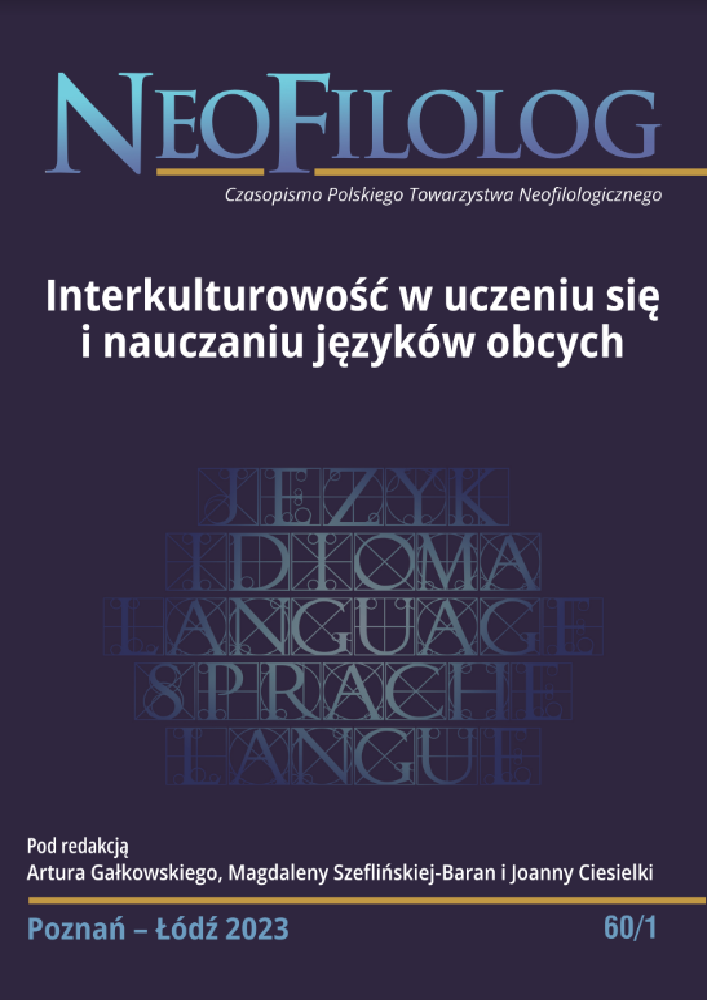Abstract
The aim of the article is to describe our proposition of method of developing sensitivity to different cultures, and in particular cultural and intercultural competence during Italian translation workshops. It discusses the content of higher education books for teaching functional languages. The authors pay special attention to the selection of appropriate authentic texts and real-life curiosities that go beyond the basic messages conveyed during courses and in the textbooks. In the analysed university script, one can find texts about atypical historical, linguistic, literary, and cinematic references or about surprising common points that allow the learner to relate to Polish and even to his or her local context. The authors share their reflections on the reception of the book by students.
References
Danesi M., Diadori P., Semplici S. (2018), Tecniche didattiche per la seconda lingua. Roma: Carocci.
Ciesielka J. (2015), Parole d’arte. Introduzione al linguaggio artistico. Łódź: Uniwersytet Łódzki, Wydział Filologiczny, Katedra Filologii Romańskiej, Zakład Italianistyki.
Ciesielka J., Woch A. (2017), Nauczanie specjalistycznych odmian języka włoskiego na łódzkiej italianistyce z translatoryką, (w:) Marcinkowska-Bachlińska M., Curkan-Dróżka E. (red.), Multi-Lingua-Didactica 2. Nowy wymiar dydaktyki języków obcych w edukacji szkolnej i akademickiej. Łódź: Wydawnictwo Primum Verbum, s. 152–165.
Diadori, P. (2012). Teoria e tecnica della traduzione. Strategie, testi e contesti. Milano: Mondadori Education.
Diadori, P. (2018). Tradurre: una prospettiva interculturale. Roma: Carocci.
Diadori, P. (2022). Tradurre per il turismo. Da e verso l’italiano. Firenze: Franco Cesati.
Gałkowski A. (2017), Nomi degli aeroporti in Italia: tra crematonimia e neotoponimia. „Rivista Italiana di Onomastica”, nr XXIII/2, s. 565-578.
Grucza F. (2017), O kulturze, kulturach i kulturologii. O tłumaczach, tłumaczeniu i translatoryce, Warszawa: Wydawnictwo Naukowe Instytutu Komunikacji Specjalistycznej i Interkulturowej Uniwersytetu Warszawskiego.
Hofstede G. (2000), Kultury i organizacje. Warszawa: Polskie Wydawnictwo Ekonomiczne.
Kaczmarek T., Jarosz A. (2022), Il linguaggio dello spettacolo. Lessico italiano-polacco del teatro del cinema, della radio e della televisione. Łódź: Wydawnictwo Uniwersytetu Łódzkiego.
Kaczmarek T., Jarosz A. (2015), Dizionario italiano-polacco della terminologia teatrale. Łódź: Uniwersytet Łódzki, Wydział Filologiczny, Katedra Filologii Romańskiej, Zakład Italianistyki.
Kaliska M. (2018), Model uczenia języków obcych w szkole wyższej na przykładzie języka włoskiego. Założenia teoretyczne, metodologia nauczania i zintegrowany rozwój kompetencji, (w:) Grucza S. (red.), Studi@ Naukowe 42. Warszawa: Wydawnictwo Naukowe Instytutu Komunikacji Specjalistycznej i Interkulturowej Uniwersytet Warszawski, https://depot.ceon.pl/bitstream/handle/123456789/19338/Marta_Kaliska_Model_uczenia_jezykow.pdf?sequence=1 [DW 10.10.2022].
Magajewska M. (2015), Linguaggio delle belle arti, del teatro e del cinema. Livello medio e avanzato. Łódź: Uniwersytet Łódzki, Wydział Filologiczny, Katedra Filologii Romańskiej, Zakład Italianistyki.
Michalik U. (2005), Kształtowanie świadomości kulturowej oraz poprawianie komunikacji międzykulturowej jako niezbędny element edukacji w dobie globalizacji. „Nauczyciel i Szkoła”, nr 1–2 (26–27), s. 25–39.
Mollica A. (2010). Ludolinguistica e glottodidattica. Perugia: Guerra.
Pichiassi M. (1999), Fondamenti di glottodidattica. Perugia: Guerra Edizioni.
Rak M. (2015), Co to jest kulturem?. „LingVaria”, nr 2 (20), s. 305-316. DOI: https://doi.org/10.12797/LV.10.2015.20.23
Thomas A. (1996), Analyse der Handlungwirksamkeit von Kulturstandards, (w:) Thomas A. (red.), Psychologie des Interkulturellen Handelns. Göttingen: Hogrefe Verlag, s. 107–135.
Woch A., Groblińska J., Kowalik K. (2021), Utile e traducibile. Esercizi di lessico settoriale e quotidiano. Łódź: Wydawnictwo Uniwersytetu Łódzkiego.
License
Copyright (c) 2023 Katarzyna Kowalik, Agnieszka Woch

This work is licensed under a Creative Commons Attribution-NoDerivatives 4.0 International License.
Authors
Authors of texts accepted for publication in Neofilolog are required to complete, sign and return to the Editorial team’s office the Agreement for granting a royalty-free license to works with a commitment to grant a CC sub-license.
Under the agreement, the authors of the texts published in Neofilolog grant Adam Mickiewicz University in Poznań a non-exclusive, royalty-free license and authorize the use of Attribution-NoDerivatives 4.0 International (CC BY-ND 4.0) Creative Commons sub-license.
The authors retain the right to the free disposal of the work.
Users
Interested Internet users are entitled to use works that have been published in Neofilolog since 2017, under the following conditions:
▪ attribution – obligation to provide, together with the distributed work, information about the authorship, title, source (link to the original work, DOI) and the license itself.
▪ no derivatives – the work must be preserved in its original form. Without the author's consent, it is not possible to distribute the modified work in the form of translations, publications, etc.
Copyrights are reserved for all texts published since 2017.
Miscellaneous
Adam Mickiewicz University in Poznań retains the property right as a whole (layout, graphic form, title, cover design, logo etc.).

